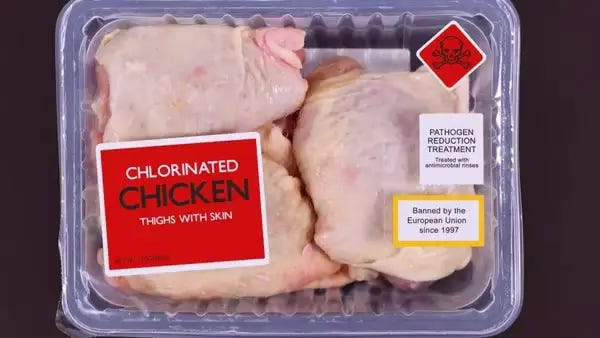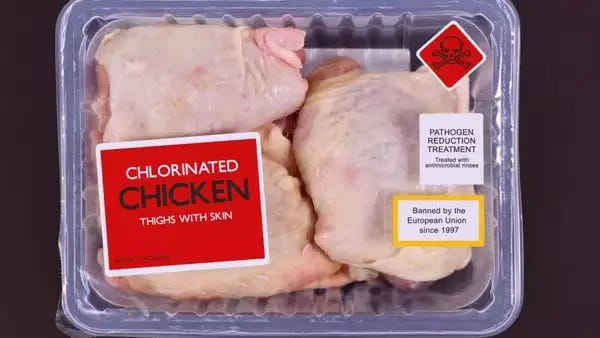David Vance SubstackRead More
Well, here’s a curious stand off! In a statement published alongside the tariff announcement the other evening, the White House has said: “The UK maintains non-science-based standards that severely restrict US exports of safe, high-quality beef and poultry products.” It suggested that Britain’s ban on chlorinated chicken was among a range of “non-tariff barriers” that limit the US’s ability to trade.
The UK has long ruled out allowing imports of chlorine-washed chicken from the US due to “health concerns”, with Downing Street reiterating its manifesto commitment to high food standards.
It’s a game of chicken but what is REALLY going on here?
Yes, the debate over whether we should accept chlorinated chicken—(poultry washed with chlorine to eliminate bacteria like salmonella)—has been a contentious issue. The UK media has been hysterical on the topic. One could be forgiven for thinking that chlorinated chicken is radioactive based on some of the many hit pieces out there. While some will argue it’s a symbol of lower food standards, there are some very good reasons why the UK should consider embracing it: safety, economic benefits, consumer choice, and alignment with global trade realities.
First, chlorinated chicken is demonstrably safe. The chlorine wash, typically using low concentrations of chlorine dioxide or hypochlorite, is a proven method for reducing pathogens. The European Food Safety Authority (EFSA) has acknowledged that chlorine washes, when used correctly, do not pose a health risk to consumers. The U.S. has employed this practice for decades, and its population shows no evidence of adverse health effects linked to it. Critics often point to the chlorine itself as a hazard, but the levels used are minuscule—far below what’s found in swimming pools or drinking water—and rinse off before consumption. The UK’s own food safety standards could easily regulate its application, ensuring no compromise to public health. Furthermore the UK ITSELF uses chlorine washed salads so the practise is already here.
Economically, accepting chlorinated chicken may bolster the UK’s trade position with Trump. Post-Brexit, the UK needs to forge new trade agreements, and rejecting chlorinated chicken risks alienating the U.S., which exports significant poultry volumes. Importing cheaper chlorinated chicken could lower food prices, a boon for consumers facing rising costs of living. UK producers might fear competition, but this could incentivise innovation and efficiency in the domestic poultry sector. Subsidies or labeling requirements could protect British farmers while still reaping trade benefits. A refusal to compromise on this issue may very well weaken the UK’s negotiating leverage, limiting our access to broader markets for our own exports.
Consumer choice is another compelling argument. Banning chlorinated chicken assumes UK consumers can’t decide for themselves what to eat. If clearly labeled, chlorinated chicken could sit alongside organic or free-range options, letting the market dictate demand. Many Brits already prioritise affordability over production methods—evidenced by the popularity of budget supermarket ranges. Denying access to a safe, cost-effective product infantilises consumers and restricts their freedom. Education campaigns could inform the public about the process, dispelling myths and fostering informed decisions rather than blanket prohibitions.
Finally, accepting chlorinated chicken aligns with global trade realities. The practice isn’t unique to the U.S.—countries like Canada and Australia also permit similar antimicrobial washes. The EU’s ban, which the UK inherited (and has chosen to keep) is often seen as protectionist rather than science-based, a stance the World Trade Organisation has questioned. Why should the UK cling to outdated EU dogma? Embracing chlorinated chicken signals flexibility and pragmatism, qualities essential for thriving in a competitive world.
Accepting chlorinated chicken isn’t about lowering standards; it’s about adapting to a changing world, prioritising evidence over sentiment, and balancing economic opportunity with consumer needs.
It seems to me that the UK should seize this chance to redefine our food future, demonstrate good will to President Trump and further separate the UK from the EU.
****If you enjoy all the content that I put out here every day, can I ask you to consider to becoming a PAID subscriber, it’s only £5 a month, you can cancel if you don’t enjoy it but I know you will. I want to thank the kind people who already do this, without your help this becomes impossible. Thank you in anticipation***





































